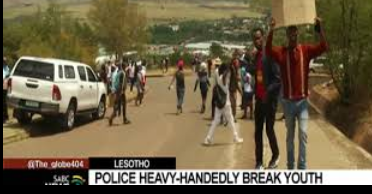Photos: YouTube
Lesotho’s authorities and incoming government must address unresolved cases of police brutality, torture and unlawful killings and ensure accountability for these human rights crimes beyond the electioneering period for the 7 October vote, Amnesty International said today.
“A dangerous pattern of human rights violations, including torture, unlawful killings, and excessive use of force by members of the security forces in Lesotho has been a common feature of the past five years under the current coalition government,” said Muleya Mwananyanda, Amnesty International’s Director for East and Southern Africa.
“Political candidates vying for leadership positions, including parliamentary seats, in the upcoming general elections must make a commitment to put respect for human rights and accountability for past human rights violations front and centre of their campaigns. If elected, they must ensure access to justice and effective remedies for the victims of these human rights crimes.”
Since 2017, Lesotho has seen a number of human rights violations, including excessive and disproportionate use of force by the security forces. There have also been reports of unlawful killings, torture and other ill-treatment of suspected perpetrators of crime by members of the security forces, including the Lesotho Mounted Police Service and the Lesotho Defence Forces.
Unlawful killings
The unlawful use of force by police in Lesotho has resulted in unlawful killings, including on 16 June 2022, when police opened fire at students at the National University of Lesotho, who were protesting cuts to their living allowance, even though they did not pose an imminent threat. The gunfire killed one student, Kopano Francis Mokutoane, and injured several others. Several police officers were suspended for their use of excessive and unlawful force during the protests.
On 2 September 2021, officers from Thetsane Police Station in Maseru arrested Tseliso Sekonyela on suspicion of stealing liquor. He later died in police custody with officers delivering his body to a morgue on 4 September 2021 without stating the cause of his death.Sekonyela had told his mother when she went to see him in the holding cell at the police station that police officers had beaten him. His mother also alleged that a police officer had threatened to break her son’s ribs in her presence. Three police officers were later suspended pending an investigation into Sekonyela’s death.
Although some members of the police were suspended for their actions, including the killing of Mokutoane, other members of the security forces remain in their posts despite ample evidence including research by human rights NGOs pointing to serious human rights violations.
Torture and other ill-treatment
Amnesty International also documented cases of torture and other ill-treatment by the security forces.
In one such case, on 13 January 2022, 34-year-old human rights lawyer, Napo Mafaesa was arrested by members of the Lesotho Mounted Police Service on allegations of concealing a gun belonging to his client. According to information available to Amnesty International, police officers took him to Ha Mabote Police Station and subjected him to torture in order to extract a “confession” from him, even though he told them he knew nothing about the gun.
Police shackled Mafaesa’s legs and bound his hands before putting a deflated tyre pressed to his face causing him to struggle to breathe through his nose and mouth. They repeatedly poured cold water on his face while assaulting him. Mafaesa was freed in the early hours of 14 January in serious pain and is suing the police for about US$28,000 for the torture he claims he suffered.
In another case, Mateboho Matekane, from Ha Pita in Maseru was arrested on 30 November 2021, accused of stealing group savings funds.
She told Amnesty International that she was taken to Lithoteng Police Station where she was beaten with a spade, including on her buttocks until she urinated on herself and passed out. She later lost her job because the torture she suffered meant she was in too much pain to be able to work. She is also suing the police for torture.
On 19 May 2022, 35 people were tortured by police officers and members of the Lesotho Defence Forces for protesting against power cuts in Liseleng in the district of Thaba-Tseka. The victims, 19 men and 16 women, were beaten up and made to roll for several metres along a muddy road leading to nearby Matsoku River and then back again. They were charged with disturbing the peace.
Legal action against the police
Police authorities in Lesotho are facing a number of legal claims over crimes ranging from murder, cover-up and defeating the ends of justice, to assault, torture and death in police custody. One law firm in Maseru is pursuing 58 cases of police brutality recorded since 2018.Police authorities, including Police Commissioner Holomo Molibeli, admitted to Amnesty International during a meeting at police headquarters in Maseru in July that torture and other human rights violations cases have come up within their ranks, blaming this on “rogue police elements”.
“It is the duty of the police to protect the public, yet Lesotho’s track record of police brutality shows that the public have much to fear from their law enforcement officers. It is time for the Lesotho authorities to take a zero-tolerance attitude to unlawful killings, torture and other ill-treatment by their security forces and ensure that those suspected to be responsible are held to account. Victims must be provided with access to justice and effective remedies,” said Muleya Mwananyanda


















